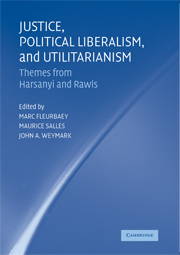Book contents
- Frontmatter
- Contents
- Preface
- List of Contributors
- 1 An Introduction to Justice, Political Liberalism, and Utilitarianism
- PART ONE THEMES FROM RAWLS
- PART TWO HARSANYI'S IMPARTIAL OBSERVER AND SOCIAL AGGREGATION THEOREMS
- PART THREE GOODNESS AND WELL-BEING
- PART FOUR SHARING THE GAINS FROM SOCIAL COOPERATION
- 13 Naturalizing Harsanyi and Rawls
- 14 The Social Contract Naturalized
- 15 An Alternative Model of Rational Cooperation
- PART FIVE RIGHTS AND LIBERTIES
- Index
13 - Naturalizing Harsanyi and Rawls
Published online by Cambridge University Press: 09 February 2010
- Frontmatter
- Contents
- Preface
- List of Contributors
- 1 An Introduction to Justice, Political Liberalism, and Utilitarianism
- PART ONE THEMES FROM RAWLS
- PART TWO HARSANYI'S IMPARTIAL OBSERVER AND SOCIAL AGGREGATION THEOREMS
- PART THREE GOODNESS AND WELL-BEING
- PART FOUR SHARING THE GAINS FROM SOCIAL COOPERATION
- 13 Naturalizing Harsanyi and Rawls
- 14 The Social Contract Naturalized
- 15 An Alternative Model of Rational Cooperation
- PART FIVE RIGHTS AND LIBERTIES
- Index
Summary
He who would understand baboon would do more towards metaphysics than John Locke.
Charles DarwinIntroduction
This chapter reviews a number of ideas drawn in two books: Game Theory and the Social Contract and Natural Justice (Binmore, 1994, 1998, 2005). The first volume of Game Theory and the Social Contract was published in 1994 with the subtitle Playing Fair. The second volume was published in 1998 with the subtitle Just Playing. Natural Justice is a popular acccount of the same material. The current chapter focuses on three issues.
Harsanyi scholarship. Some of the criticisms leveled at Harsanyi's (1977) utilitarian theory are answered by offering an account of his ideas to which the criticisms do not apply. In doing so, this chapter distinguishes two separate lines of thought to which Harsanyi has contributed: a teleological and a nonteleological approach.
Comparison of Harsanyi and Rawls. Harsanyi's nonteleological approach to utilitarianism is compared with Rawls's (1971) defense of egalitarianism. It is argued that Rawls would also have been led to utilitarianism if he had not adopted the iconoclastic expedient of abandoning Bayesian decision theory in favor of the maximin criterion. But the Rawlsian conclusion survives if one abandons instead the assumption that citizens are committed to the hypothetical deal reached in the original position. The distinction between Rawls and Harsanyi then becomes a question of whether an external enforcement agency is available to police the rules that citizens make for themselves under ideally fair circumstances.
- Type
- Chapter
- Information
- Justice, Political Liberalism, and UtilitarianismThemes from Harsanyi and Rawls, pp. 303 - 333Publisher: Cambridge University PressPrint publication year: 2008
- 4
- Cited by



